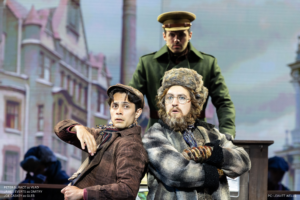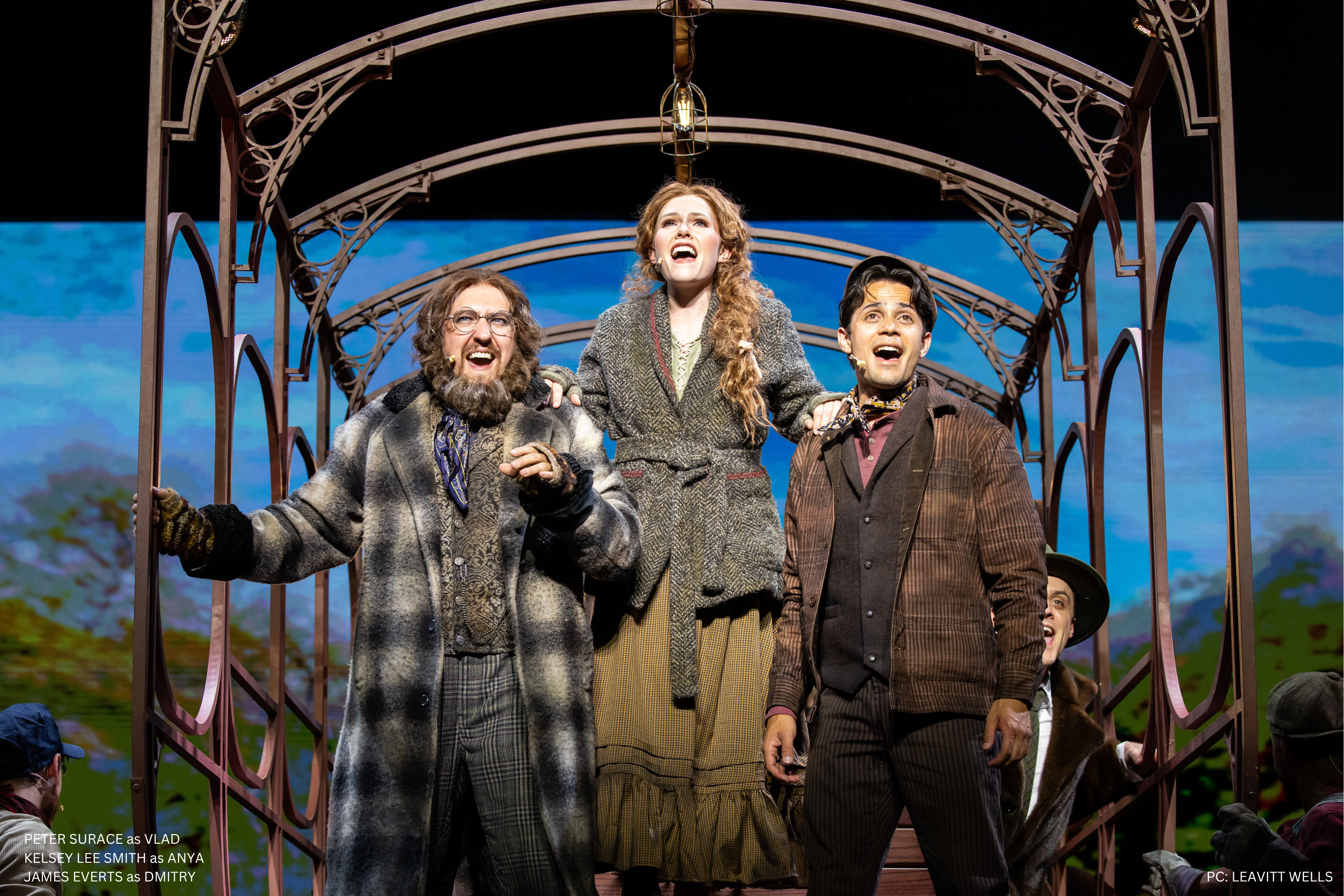IVINS – Anastasia, a film that was a staple in many homes in America after its release in 1997, features a star-studded cast, award winning music, and heart-warming messages of home, love, and family. It became so popular that it received a musical adaptation on Broadway in 2017. While it has generally received positive reviews, its occasionally creaky writing and bold choice to make Communist Russia itself the villain do make the production somewhat hard to pull off. While Tuacahn succeeds in creating an entertaining show in many aspects, I wouldn’t say it is perfect by any means.
With music and lyrics by the iconic and brilliant Stephen Flaherty and Lynn Ahrens, (Ragtime, Once on this Island, Lucky Stiff, Seussical,) one can expect the music to be magical. The story (written by Terrence McNally) follows a young woman named Anya, an impoverished orphan who grew up with no memory of her past. She finds two conniving, quirky con-men hoping to convince someone to impersonate the long lost princess, Anastasia, for reward money. Soon, Anya finds herself roped into the scheme — yet, as she begins to learn about the lost princess, some things start to feel strangely familiar…
The talent of those on and off stage is clear. Madeline Raube as Countess Lily and Peter Surace as Vlad are certainly the stars of the production. As soon as Raube walks onstage, the air is filled with the magnificent color and animation of her voice, bringing wonderful life to the script’s words. Her physicality is spectacularly lively and always believable. As soon as she wiped a revolting kiss from her hand using the entire length of her leg, causing the audience to roar, I knew she was a standout among the cast. Surace is a bundle of unrestricted joy, whether he’s slouching casually on the train window like he owns the place or jiggling his knees with musical glee as he talks about Lily, his energy and sense of play is infectious. The best numbers in the production are “Land of Yesterday” and “The Countess and the Common Man” due to this stellar pair of actors’ incredible performances.
From a technical standpoint, choreography by Bill Burns is especially lovely. The dancers flounce and jive during “Paris Holds the Key (To Your Heart)”, executing charming charlestons and picture perfect poses. “Quartet at the Ballet” was absolutely stunning, causing my jaw to drop at the completely refined and masterful skill of these dancers and Burns’ choices. I especially loved this scene because it represents such brilliant visual and auditory storytelling as the actors’ immaculate voices (thanks to direction from Daniel Mollett) narrate the characters’ thoughts as the dancers present a flawless and satisfying parallel story in “Swan Lake.”
Lighting design by Rob Siler also succeeds in first-rate storytelling throughout the production, particularly through the use of a pink lighting that occurs in dream-like moments, and moments of idealism and love. The first time I noticed this flood of luxurious yet soft light was in the bridge of “In My Dreams,” after Anya moves from mentioning her traumatic formative years and begins to talk about her deepest desires: home, love, and family. It appeared again when Dimitry starts to explain tender memories with his father, causing pink to wash over the palace backdrop. Lastly, when Dimitri sings “Everything to Win”, the stage turns pink as his thoughts turn to the women he loves…then, drastically, the pink is expelled as Anya enters the stage, furious, threatening to end his precious dream. This pink feels like spring flowers after a seemingly unending winter or a rustic sunset at the end of a long and tired day, perfectly representing how it feels to desperately fight for your dreams through hardship.

Projections by Aaron Rhyne are at times astonishing, such as when the rapidly moving railroad projection shifts as the train changes perspectives onstage, or when ghosts suddenly dance on the rocks besides the audience in “Once Upon a December,” creating a truly immersive, magical experience. However, some projections felt out of place and rather distracting. For example, near the end of “In a Crowd of Thousands” when a major discovery is made, the projections suddenly shift to thousands of stars, an image strangely symbolic and abstract while others in the production had been purely location based. This shift at one of the most important moments in the show is poorly timed and pulls attention away from the characters. The star motif, which is repeated later, doesn’t quite feel like it’s from the world of the play.
Other moments did not feel very believable or fitting for the play. When the three street women enter Gleb’s office, for example, I didn’t quite believe the characters’ awful circumstances because their movements were overly theatrical and the actors dragged out their words cartoonishly. When Gleb grabs one of their arms and the woman shakes so intensely and quickly with fear, it did not feel grounded in reality, especially since Joe Caskey’s portrayal of Gleb hardly feels intimidating due to his unanimated voice and dull physicality. It feels like scenes like these are not as crisp and clear as one would expect from a professional theater.
This perhaps contributes to why some actors’ performances do not feel especially impactful or effective. Kelsey Lee Smith’s portrayal of Anya is filmesque: grounded in reality and deeply complex and interesting. Yet, her acting performance feels so internal that her energy does not seem to fill the theater the way her dazzling singing does. James Everts’ performance seems to have the shape of Dimitry (cocky, confident physicality with dismissive, frivolous hand gestures and, of course, a sensational voice) but not the depth. Personally, I found it a bit shallow, but that may also be due to the creaky writing.
While Tuacahn’s Anastasia certainly has its faults, my partner and I still found it to be a lovely night at the theater due to some wonderful design elements, stellar acting, and marvelous singing. I recommend it to those who love the movie and its iconic songs, although they should expect the plot to be pretty different. Overall, Anastasia is a lovely journey to the past for those who love Anya and her story.
[box] Anastasia plays from now until October 18th (on alternating days) at 8:45pm, at Tuacahn Amphitheatre (1100 Tuacahn Drive, Ivins, Utah 84738). Tickets are $35-$158. For more information, visit https://www.tuacahn.org/.[/box]

